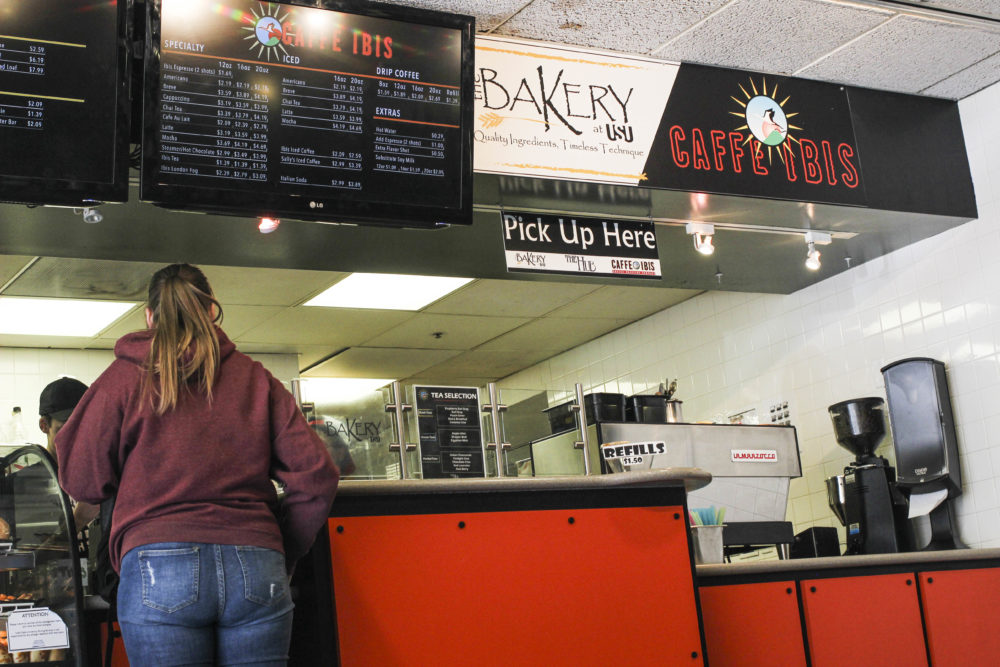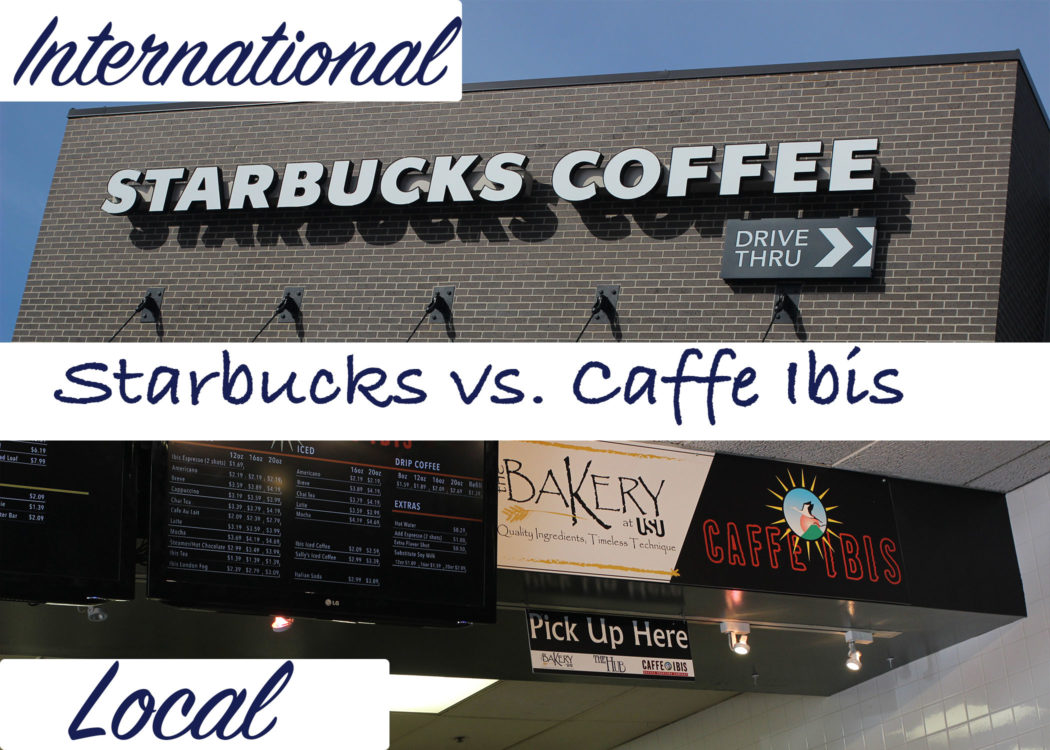Coffee Shop Comparison: Starbucks vs Caffe Ibis
People go to coffee shops for all sorts of reasons and each coffee shop has individual missions, attributes, and environments that make them unique. Logan coffee shops are no different.
The international chain Starbucks wants customers to “have a place for business or leisure, somewhere to go with genuine, authentic coffee and a comfortable environment,” according to a Starbucks corporate representative.
The local business Caffe Ibis wants customers to “enjoy a quality cup of coffee, good customer service, and a chance to take a breath and relax,” said owner Sally Sears.
From prices to environmental efforts, Starbucks and Caffe Ibis both have many characteristics that differentiate one from another.
Starbucks has two locations in Logan, the North Starbucks at 1620 N. Main St, and the South Starbucks at 724 S. Main St.
Caffe Ibis has two locations in Logan, one shop at 52 Federal Ave, and a kiosk on the first floor of the Taggart Student Center. Caffe Ibis coffee is also served at local restaurants, such as Even Stevens, and local events such as Cache Valley Gardeners Market.
Most Starbucks shops in North America are corporate owned and operated, according to MSA Worldwide. However, locations such as airports, universities and other high-traffic retail locations are not owned by Starbucks corporate, but individual contractors.
Caffe Ibis is owned by Sears and the late Randy Wirth, residents of Logan. The two met in Logan and opened a “mom-and-pop shop for organic products, like Whole Foods in the 70s,” Sears said. In 1985, the organic products store morphed into Caffe Ibis when they realized their passion was for coffee.
Both Starbucks and Caffe Ibis are certified fair trade coffee businesses.
Fair trade coffee has been certified to meet certain standards. These standards include having partnerships between organizations that have dialogue, respect and transparency with each other. All partnerships must seek equality in international trade. Coffee bean farmers are offered certain quality trading conditions with a fair trade partnerships.
Fair trade organizations are also required to actively support producers and sustainable environmental practices, farming or otherwise. These organizations also prohibit forced labor and child labor.
All of Starbucks coffee is “responsibly grown” and fair trade according to a Starbucks corporate representative.
 Tim Carpenter
Tim Carpenter Caffe Ibis coffee is organic and fair trade. Their coffee is also Smithsonian Shade Grown “bird-friendly.” This means they buy shade-grown coffee beans, which is beneficial because shade-grown coffee compares to a natural grown forest and is more sustainable than sun grown coffee, according to Robert Rice, an ecologist at the Smithsonian Migratory Bird Center.
Starbucks and Caffe Ibis have differing prices, but the the price difference between both coffee shops is only about 12 cents on coffee and espresso beverages.
Starbucks coffee charges $2.95 for a 12 oz caffe latte, and $1.85 for a 12 oz plain coffee.
Caffe Ibis charges $3.15 for a 12 oz caffe latte, and $1.95 for a 12 oz plain coffee.
Starbucks charges more for blended beverages than Caffe Ibis, and Caffe Ibis charges more for freshly brewed coffees than Starbucks. Other beverage prices are, on average, between 12 cents of each other.
Starbucks is known for sleek, modern studio-style shops. These shops come in all shapes and sizes, but aim to keep a consistent environment with space to work, talk, and drink coffee, according to a Starbucks corporate representative.
“(Starbucks) is less of a stressful academic environment, there is much less pressure than somewhere on campus,” said Madison Collins, a student at Utah State University.
Caffe Ibis is a more traditional coffee shop, with green walls and wooden tables filling two rooms.
“Ibis is a good place because for students because you have caffeine and it is a good place to study and not be distracted. It is a good place to get out of the student bubble,” said Arlon Jacobs, a customer at Caffe Ibis and student at USU.
All Starbucks locations offer free WiFi for customers with no time limit.
“Starbucks does not enforce time limits on WiFi services so customers feel they can work on what they need to,” said a Starbucks corporate representative.
Caffe Ibis does not offer WiFi to customers. Sears says that about a year and a half ago, the shop stopped offering the service.
“We thought it would be an opportunity for people to have a conversation. We wanted people to not be plugged in for every minute of every day and to have a minute of silence in their life,” Sears said.
“They don’t have WiFi. They are trying to keep it old school in a lot of ways,” said Rachel Chamberlain, an employee at Caffe Ibis.
 Tim Carpenter
Tim Carpenter Both Starbucks and Caffe Ibis actively take part in environmental and social programs but contribute to different partnerships.
According to Starbucks corporate, all of their coffee is purchased ethically and responsibly from farmers with the highest quality products, and they hope their efforts have a social impact.
“Starbucks is dedicated to helping farmers overcome the challenges facing coffee communities. We are committed to buying 100 percent ethically sourced coffee in partnership with Conservation International,” said a Starbucks corporate representative. Starbucks has invested more than $100 million towards these efforts.
Starbucks has donated 100 million disease-resistant trees to help farmers fight environmental threats such as coffee leaf rust.
“All of these programs directly support improving farmer livelihoods and ensuring a long-term supply of high-quality coffee for the industry,” said a Starbucks corporate representative. “We strive to reduce the impact our stores have on the environment.”
Caffe Ibis is a “Green Business” with a mission to give respect to their sellers whose labor gives them their products.
“We take our values and our passion about coffee and combine them together to look at social justice and environmental stewardship,” Sears said. “We wanted to be able to serve an extraordinary cup of coffee but also take make sure we are taking care of our environment and our farmers.”
Caffe Ibis safeguards and respects the environment from which they get their coffee beans. All employees are trained to understand and regard these “extraordinary growing conditions.”
Their employees are also trained to take special care of the environment while working.
“Our big focus here is how green we are. It would be nice if people could involve themselves with that in any way whether is is bringing in your own mugs so we don’t have to use a paper cup, composting, or composting their own waste,” said manager Tom Wilson.
Caffe Ibis will make any coffee drink in a reusable mug, and offers ceramic dishes for those customers who chose to eat and drink at the store.
Students looking for a coffee shop with a quiet study environment or a lively conversation are sure to find it at either Starbucks or Caffe Ibis. With fair trade certified coffee and a desire environmental impact, both stores have distinctive coffee drinks and a unique vibe.
— brianne.sorensen@aggiemail.usu.edu
@briannesorensen


I really liked the article, but the title is misleading. It feels like if two articles from these two shops were mixed together instead of, you know, a real comparison. These would stand out on their own as shop profiles.